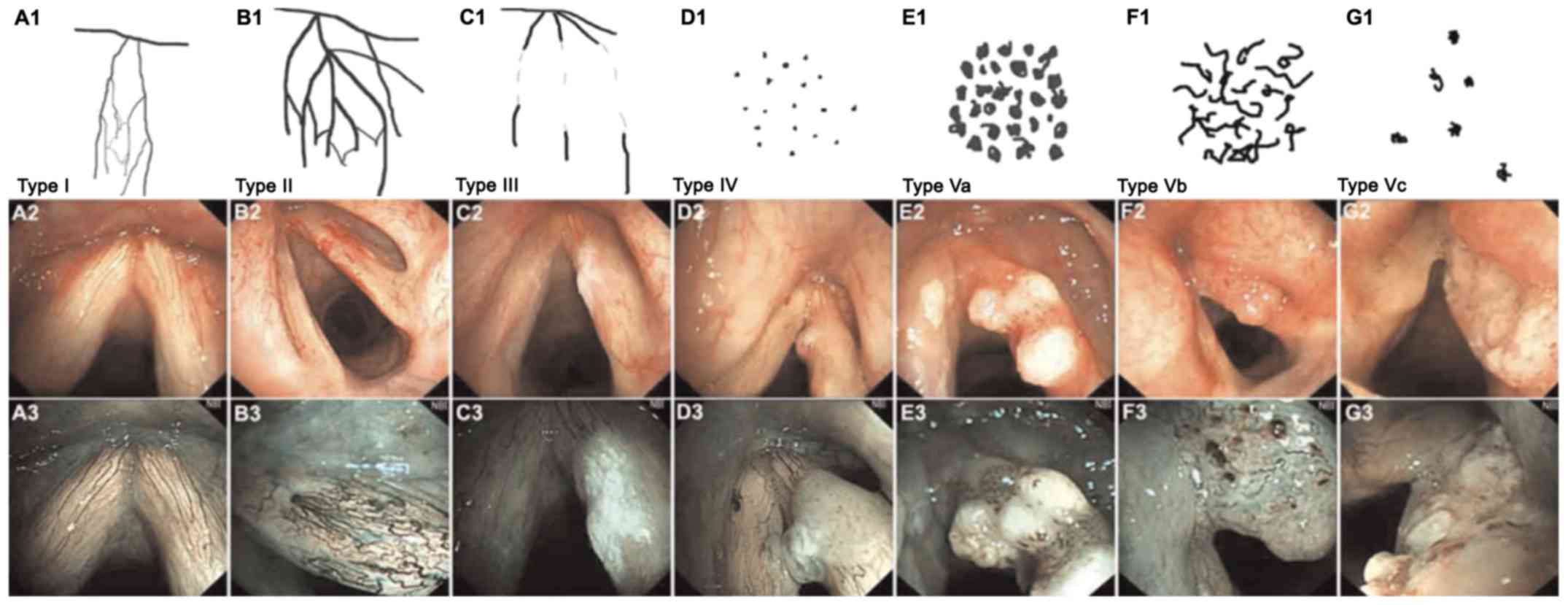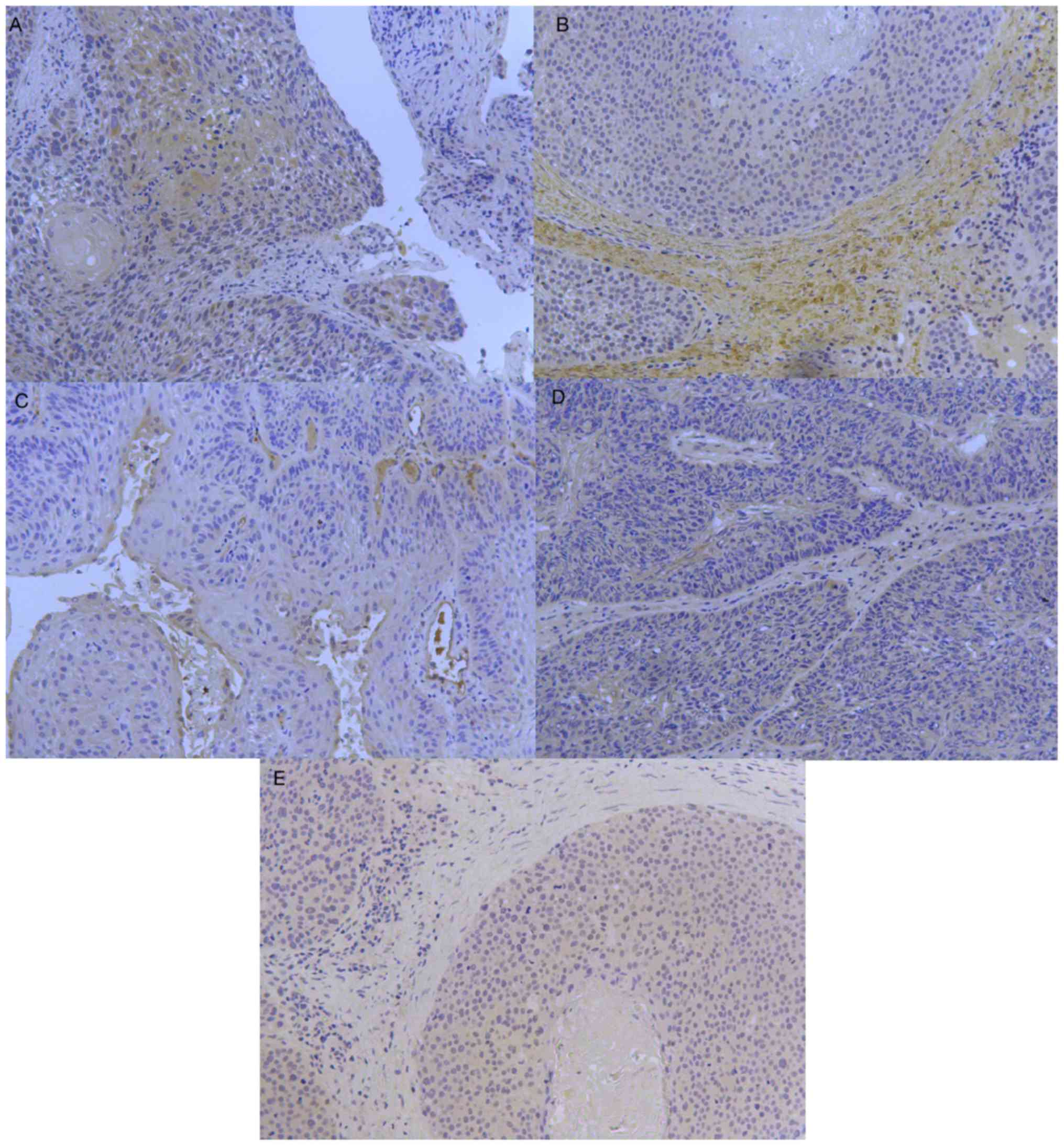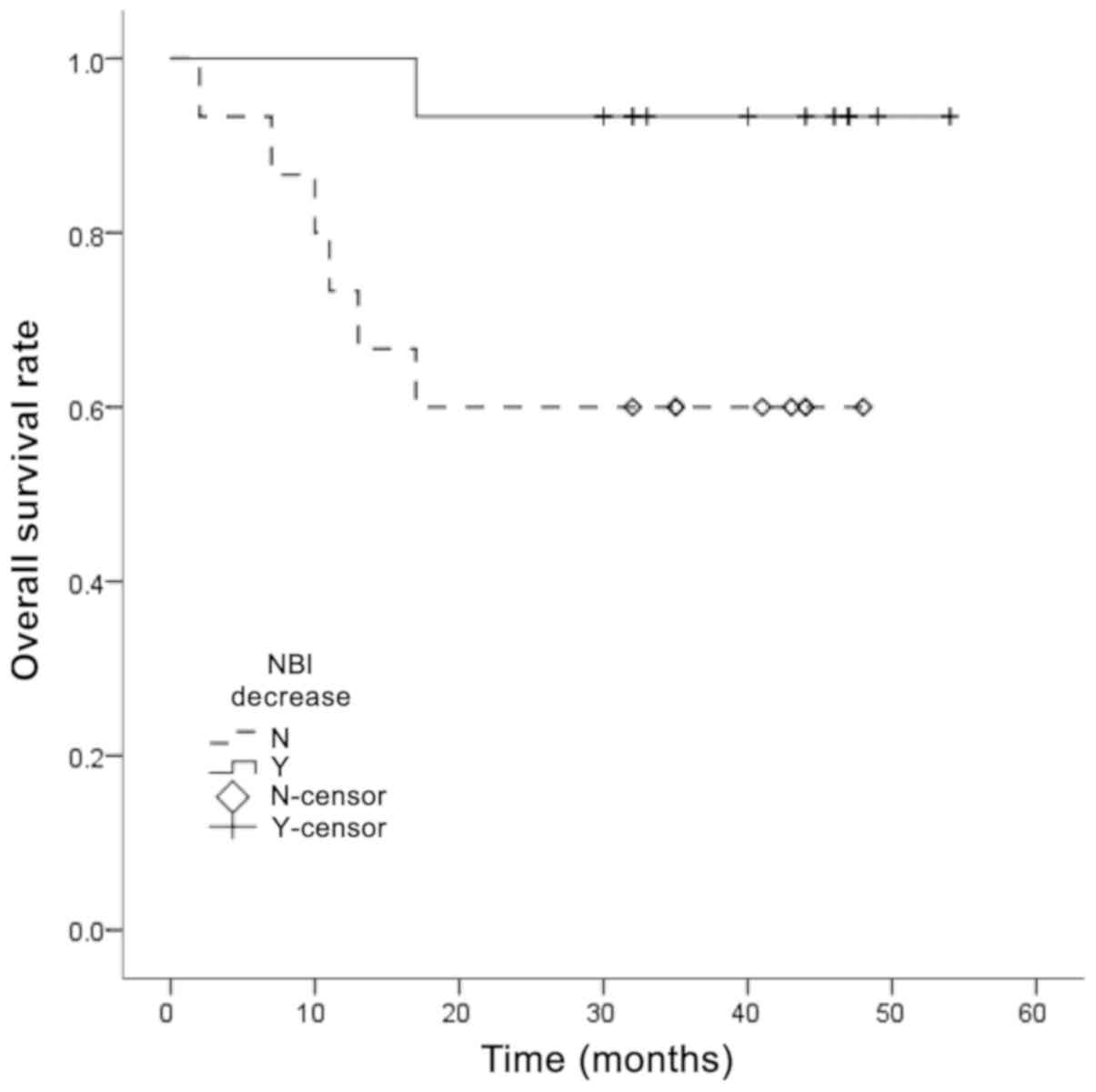|
1
|
Cooper JS, Porter K, Mallin K, Hoffman HT,
Weber RS, Ang KK, Gay EG and Langer CJ: National cancer database
report on cancer of the head and neck: 10-year update. Head Neck.
31:748–758. 2009. View Article : Google Scholar : PubMed/NCBI
|
|
2
|
Newman JR, Timothy M Connolly, Illing EA,
Kilgore ML, Locher JL and Carroll WR: Survival trends in
hypopharyngeal cancer: A population-based review. Laryngoscope.
125:624–629. 2015. View Article : Google Scholar : PubMed/NCBI
|
|
3
|
Kuo P, Chen MM, Decker RH, Yarbrough WG
and Judson BJ: Hypopharyngeal cancer incidence, treatment, and
survival: Temporal trends in the United States. Laryngoscope.
124:2064–2069. 2014. View Article : Google Scholar : PubMed/NCBI
|
|
4
|
Chen P, Yu W, Huang J, Xu H, Li G, Chen X
and Huang Z: Matched-pair analysis of survival in patients with
poorly differentiated versus well-differentiated glottic squamous
cell carcinoma. Oncotarget. 8:14770–14776. 2017. View Article : Google Scholar : PubMed/NCBI
|
|
5
|
Kang CJ, Lin CY, Wang HM, Fan KH, Ng SH,
Lee LY, Chen IH, Huang SF, Liao CT and Yen TC: The number of
pathologically positive lymph nodes and pathological tumor depth
predicts prognosis in patients with poorly differentiated squamous
cell carcinoma of the oral cavity. Int J Radiat Oncol Biol Phys.
81:e223–e230. 2011. View Article : Google Scholar : PubMed/NCBI
|
|
6
|
Pfister DG, Spencer S, Brizel DM, Burtness
B, Busse PM, Caudell JJ, Cmelak AJ, Colevas AD, Dunphy F, Eisele
DW, et al: Head and neck cancers, Version 2. 2014. Clinical
practice guidelines in oncology. J Natl Compr Canc Netw.
12:1454–1487. 2014. View Article : Google Scholar : PubMed/NCBI
|
|
7
|
Guo W, Yin GF, Huang JW, Yang Z, Liu HF,
Zhang Y, Xu HB, Liu ZY and Huang ZG: Effect of vascular changes on
prognosis after induced chemotherapy for advanced hypopharyngeal
carcinoma. Zhonghua Er Bi Yan Hou Tou Jing Wai Ke Za Zhi.
54:591–596. 2019.(In Chinese). PubMed/NCBI
|
|
8
|
Kasza A: IL-1 and EGF regulate expression
of genes important in inflammation and cancer. Cytokine. 62:22–33.
2013. View Article : Google Scholar : PubMed/NCBI
|
|
9
|
John A and Tuszynski G: The role of matrix
metalloproteinases in tumor angiogenesis and tumor metastasis.
Pathol Oncol Res. 7:14–23. 2001. View Article : Google Scholar : PubMed/NCBI
|
|
10
|
Gale N, Poljak M and Zidar N: Update from
the 4th edition of the world health organization classification of
head and neck tumours: What is new in the 2017 WHO blue book for
tumours of the hypopharynx, larynx, trachea and parapharyngeal
space. Head Neck Pathol. 11:23–32. 2017. View Article : Google Scholar : PubMed/NCBI
|
|
11
|
Amin MB: American Joint Committee on
Cancer. American Cancer Society. AJCC Cancer Staging Manual. 8th.
Springer; Chicago, IL: 2017
|
|
12
|
Ni XG, He S, Xu ZG, Gao L, Lu N, Yuan Z,
Lai SQ, Zhang YM, Yi JL, Wang XL, et al: Endoscopic diagnosis of
laryngeal cancer and precancerous lesions by narrow band imaging. J
Laryngol Otol. 125:288–296. 2011. View Article : Google Scholar : PubMed/NCBI
|
|
13
|
Engel KB and Moore HM: Effects of
preanalytical variables on the detection of proteins by
immunohistochemistry in formalin-fixed, paraffin-embedded tissue.
Arch Pathol Lab Med. 135:537–543. 2011.PubMed/NCBI
|
|
14
|
Jain RK and Carmeliet P: SnapShot: Tumor
angiogenesis. Cell. 149:1408 e12012. View Article : Google Scholar
|
|
15
|
Loges S, Clausen H, Reichelt U, Bubenheim
M, Erbersdobler A, Schurr P, Yekebas E, Schuch G, Izbicki J, Pantel
K, et al: Determination of microvessel density by quantitative
real-time PCR in esophageal cancer: Correlation with histologic
methods, angiogenic growth factor expression, and lymphnode
metastasis. Clin Cancer Res. 13:76–80. 2007. View Article : Google Scholar : PubMed/NCBI
|
|
16
|
Bach F, Uddin FJ and Burke D:
Angiopoietins in malignancy. Eur J Surg Oncol. 33:7–15. 2007.
View Article : Google Scholar : PubMed/NCBI
|
|
17
|
Li LY, Barlow KD and Metheny-Barlow LJ:
Angiopoietins and Tie2 in health and disease. Pediatr Endocrinol
Rev. 2:399–408. 2005.PubMed/NCBI
|
|
18
|
Wu H: Morphological changes of capillary
loops in the epithelial papilla and correlation between vascular
growth factors, infiltration related cytokines and superficial
esophageal cancer [dissertation]. Shandong University. (Shandong).
2017.
|
|
19
|
Tsutsui S, Inoue H, Yasuda K, Suzuki K,
Takeuchi H, Nishizaki T, Higashi H, Era S and Mori M:
Angiopoietin-2 expression in invasive ductal carcinoma of the
breast: Its relationship to the VEGF expression and microvessel
density. Breast Cancer Res Treat. 98:261–266. 2006. View Article : Google Scholar : PubMed/NCBI
|
|
20
|
Viallard C and Larrivée B: Tumor
angiogenesis and vascular normalization: Alternative therapeutic
targets. Angiogenesis. 20:409–426. 2017. View Article : Google Scholar : PubMed/NCBI
|
|
21
|
De Bock K, Cauwenberghs S and Carmeliet P:
Vessel abnormalization: Another hallmark of cancer? Molecular
mechanisms and therapeutic implications. Curr Opin Genet Dev.
21:73–79. 2011. View Article : Google Scholar : PubMed/NCBI
|
|
22
|
Bikfalvi A: History and conceptual
developments in vascular biology and angiogenesis research: A
personal view. Angiogenesis. 20:463–478. 2017. View Article : Google Scholar : PubMed/NCBI
|
|
23
|
Fujisaka S, Usui I, Ikutani M, Aminuddin
A, Takikawa A, Tsuneyama K, Mahmood A, Goda N, Nagai Y, Takatsu K
and Tobe K: Adipose tissue hypoxia induces inflammatory M1 polarity
of macrophages in an HIF-1α-dependent and HIF-1α-independent manner
in obese mice. Diabetologia. 56:1403–1412. 2013. View Article : Google Scholar : PubMed/NCBI
|
|
24
|
Falanga V, Zhou L and Yufit T: Low oxygen
tension stimulates collagen synthesis and COL1A1 transcription
through the action of TGF-beta1. J Cell Physiol. 191:42–50. 2002.
View Article : Google Scholar : PubMed/NCBI
|
|
25
|
Lu SL, Reh D, Li AG, Woods J, Corless CL,
Kulesz-Martin M and Wang XJ: Overexpression of transforming growth
factor beta1 in head and neck epithelia results in inflammation,
angiogenesis and epithelial hyperproliferation. Cancer Res.
64:4405–4410. 2004. View Article : Google Scholar : PubMed/NCBI
|
|
26
|
Biobe GC, Schiemann WP and Lodish HE: Role
of transforming growth factor beta in human disease. N Engl J Med.
343:1350–1358. 2000.PubMed/NCBI
|
|
27
|
Luo J, Chen XQ and Li P: The role of TGF-β
and its receptors in gastrointestinal cancers. Transl Oncol.
12:475–484. 2019. View Article : Google Scholar : PubMed/NCBI
|
|
28
|
Dang D, Yang Y, Li X, Atakilit A, Regezi
J, Eisele D, Ellis D and Ramos DM: Matrix metalloproteinases and
TGFbeta1 modulate oral tumor cell matrix. Biochem Biophys Res
Commun. 316:937–942. 2004. View Article : Google Scholar : PubMed/NCBI
|
|
29
|
Kumar S, Pan CC, Bloodworth JC, Nixon AB,
Theuer C, Hoyt DG and Lee NY: Antibody-directed coupling of
endoglin and MMP-14 is a key mechanism for endoglin shedding and
deregulation of TGF-β signaling. Oncogene. 33:3970–3979. 2014.
View Article : Google Scholar : PubMed/NCBI
|
|
30
|
Arriola BP, Scian R, Comerci DJ, Serantes
DR, Vanzulli S, Fossati CA, Giambartolomei GH and Delpino MV:
Brucella abortus induces collagen deposition and MMP-9 down
modulation in hepatic stellate cells via TGF-βl production. Am J
Pathol. 183:1918–1927. 2013. View Article : Google Scholar : PubMed/NCBI
|
|
31
|
Zhang JT, Sun W, Zhang WZ, Ge CY, Liu ZY,
Zhao ZM, Lu XS and Fan YZ: Norcantharidin inhibits tumor growth and
vasculogenic mimicry of human gallblad-der carcinomas by
suppression of the PI3-K/MMPs/Ln-5γ2 signaling pathway. BMC Cancer.
14:1932014. View Article : Google Scholar : PubMed/NCBI
|
|
32
|
Smith A, Teknos TN and Pan Q: Epithelial
to mesenchymal transition in head and neck squamous cell carcinoma.
Oral Oncol. 49:287–292. 2013. View Article : Google Scholar : PubMed/NCBI
|
|
33
|
Sun L, Diamond ME, Ottaviano AJ, Joseph
MJ, Ananthanarayan V and Munshi HG: Transforming growth
factor-beta1 promotes matrix metalloproteinase-9-mediated oral
cancer invasion through snail expression. Mol Cancer Res. 6:10–20.
2008. View Article : Google Scholar : PubMed/NCBI
|
|
34
|
Ji H, Gao Z and Feng Z: Expression of
matrix metalloproteinase-9 in squamous cell carcinoma of the tongue
with different pattern of invasion and clinical significance. J
Oral Sci Res. 28:488–490. 2012.
|
|
35
|
Colotta F, Allavena P, Sica A, Garlanda C
and Mantovani A: Cancer-related inflammation, the seventh hallmark
of cancer: Links to genetic instability. Carcinogenesis.
30:1073–1081. 2009. View Article : Google Scholar : PubMed/NCBI
|
|
36
|
Hu Y, Lu L, Qiu Z, Huang Q, Chen Y and
Chen L: Mechanical stretch aggravates aortic dissection by
regulating MAPK pathway and the expression of MMP-9 and
inflammation factors. Biomed Pharmacother. 108:1294–1302. 2018.
View Article : Google Scholar : PubMed/NCBI
|
|
37
|
Zhang HY, Zheng XZ, Wang XH, Xuan XY, Wang
F and Li SS: S100A4 mediated cell invasion and metastasis of
esophageal squamous cell carcinoma via the regulation of MMP-2 and
E-cadherin activity. Mol Biol Rep. 39:199–208. 2012. View Article : Google Scholar : PubMed/NCBI
|
|
38
|
Chang Q, Bournazou E, Sansone P, Berishaj
M, Gao SP, Daly L, Wels J, Theilen T, Granitto S, Zhang X, et al:
The IL-6/JAK/Stat3 feed-forward loop drives tumorigenesis and
metastasis. Neoplasia. 15:848–862. 2013. View Article : Google Scholar : PubMed/NCBI
|
|
39
|
Siveen KS, Prabhu K, Krishnankutty R,
Kuttikrishnan S, Tsakou M, Alali FQ, Dermime S, Mohammad RM and
Uddin S: Vascular endothelial growth factor (VEGF) signaling in
tumour vascularization: Potential and challenges. Curr Vasc
Pharmacol. 15:339–351. 2017. View Article : Google Scholar : PubMed/NCBI
|
|
40
|
Paik JS, Cho WK, Oh EH, Lee SB and Yang
SW: Palmitate induced secretion of IL-6 and MCP-1 in orbital
fibroblasts derived from patients with thyroid-associated
ophthalmopathy. Mol Vis. 18:1467–1477. 2012.PubMed/NCBI
|
|
41
|
Cui G, Yuan A, Sun Z, Zheng W and Pang Z:
IL-1β/IL-6 network in the tumor microenvironment of human
colorectal cancer. Pathol Res Pract. 214:986–992. 2018. View Article : Google Scholar : PubMed/NCBI
|
|
42
|
Cole KE, Strick CA, Paradis TJ, Ogborne
KT, Loetscher M, Gladue RP, Lin W, Boyd JG, Moser B, Wood DE, et
al: Interferon-inducible T cell alpha chemoattractant (I-TAC): A
novel non-ELR CXC chemokine with potent activity on activated T
cells through selective high affinity binding to CXCR3. J Exp Med.
187:2009–2021. 1998. View Article : Google Scholar : PubMed/NCBI
|
|
43
|
Atanackovic D, Cao Y, Kim JW, Brandl S,
Thom I, Faltz C, Hildebrandt Y, Bartels K, de Weerth A,
Hegewisch-Becker S, et al: The local cytokine and chemokine milieu
within malignant effusions. Tumour Biol. 29:93–104. 2008.
View Article : Google Scholar : PubMed/NCBI
|
|
44
|
Vlahakis SR, Villasis-Keever A, Gomez TS,
Bren GD and Paya CV: Human immunodeficiency virus-induced apoptosis
of human hepatocytes via CXCR4. J Infect Dis. 188:1455–1460. 2003.
View Article : Google Scholar : PubMed/NCBI
|

















